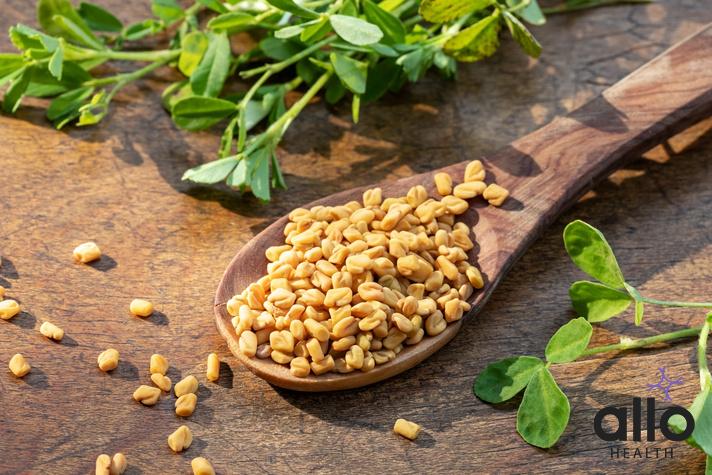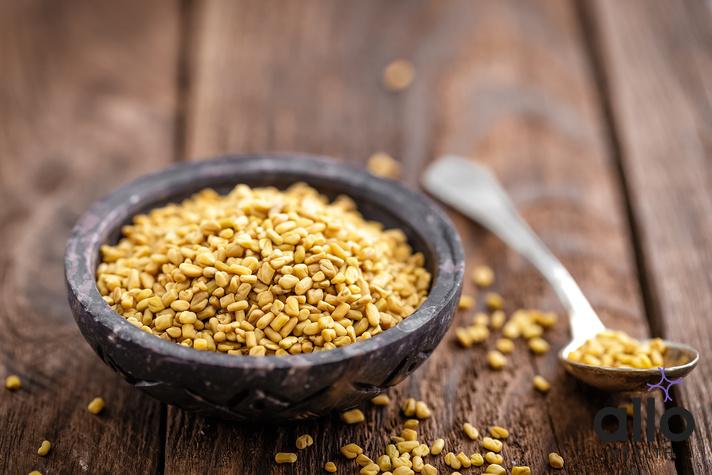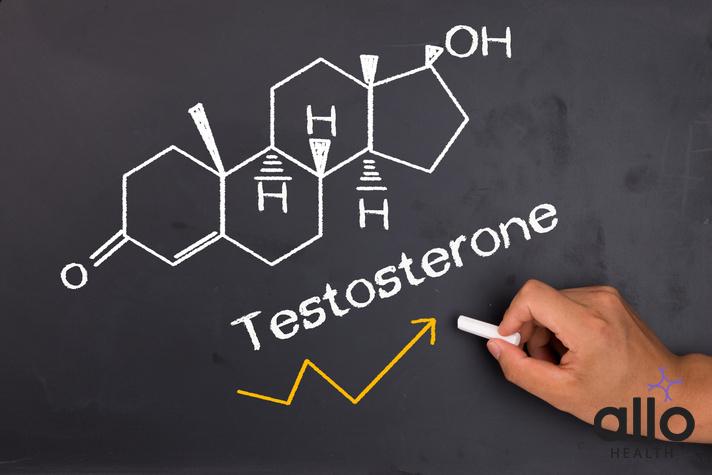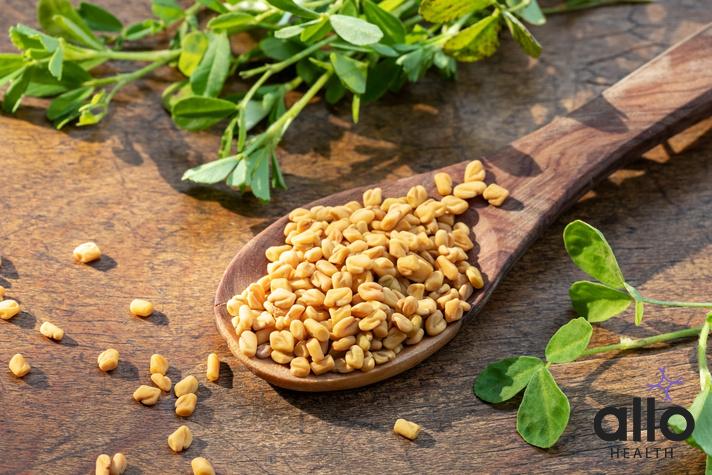Unlocking the Potential of Fenugreek for Premature Ejaculation: A Natural Remedy

Allo Health is dedicated to personalized well-being, offering support and trusted information tailored to individual health goals. The platform emphasizes human-generated content, led by a distinguished medical team of experts, including physicians and sexual health specialists. Their commitment to credibility involves rigorous fact-checking, authoritative research, and continuous updates to ensure accurate, up-to-date information. Allo Health's unique approach goes beyond conventional platforms, providing expert-led insights and a continuous commitment to excellence, with user feedback playing a crucial role in shaping the platform's authoritative voice.

Dr.Sushma.V completed MBBS degree from BGS GIMS,bangalore
Why This Was Upated?
Our experts continually monitor the health and wellness space, and we update our articles when new information became available.
Updated on 10 April, 2024
- Article was updated as part of our commitment to diversity, equity, and inclusion.

"The following blog article may discuss medical treatments and interventions. However, it is important to note that the information provided is for general educational purposes only and should not be considered as a substitute for professional medical advice, diagnosis, or treatment. Always seek the guidance of a qualified healthcare professional for personalized medical advice.
Book consultation
Medical treatments are complex and should be tailored to individual circumstances. The information presented in this blog may not be applicable to everyone, as each person's medical condition, history, and needs are unique. Only a qualified healthcare professional can evaluate your specific medical situation, consider relevant factors, and provide appropriate recommendations for diagnosis, treatment options, and monitoring.
It is crucial to note that self-diagnosis, self-medication, or relying solely on the information provided in this blog for treatment decisions can have serious health consequences. "
Premature ejaculation is a common yet embarrassing problem that affects men of all ages. It is characterized by the inability to control ejaculation during sexual activity, causing distress and frustration for both partners. While there are many conventional treatments available, some men prefer to explore natural remedies such as herbs and supplements. One such herb that has gained popularity in recent years is fenugreek. In this article, we’ll explore the benefits of fenugreek for premature ejaculation.
Understanding Premature Ejaculation: Causes and Symptoms
Before we delve into the benefits of fenugreek, let’s first understand what premature ejaculation is and its underlying causes. Premature ejaculation is defined as ejaculation that occurs within a minute of sexual penetration. It can be caused by psychological factors such as stress, anxiety, or depression, as well as physical factors such as nerve damage or hormonal imbalances. Common symptoms of premature ejaculation include difficulty in delaying ejaculation, reduced sexual pleasure, and concerns about sexual performance and self-esteem.
One of the most common psychological factors that contribute to premature ejaculation is performance anxiety. Men who are worried about their sexual performance or have had negative sexual experiences in the past may experience premature ejaculation as a result. Additionally, relationship problems, such as communication issues or unresolved conflicts, can also lead to premature ejaculation.
Physical factors that can contribute to premature ejaculation include prostate problems, thyroid issues, and certain medications. In some cases, premature ejaculation may also be a symptom of an underlying medical condition, such as diabetes or multiple sclerosis.

Understanding Fenugreek: Benefits and Composition
Fenugreek (Trigonella foenum-graecum) is indeed a versatile herb that has been used for various purposes in traditional medicine. Here’s more information on fenugreek and how it works:
- Composition: Fenugreek is rich in nutrients like vitamins (such as vitamin A, B vitamins, and vitamin C), minerals (including iron, magnesium and potassium) and proteins. It also contains fiber and phytonutrients.
- Active Compounds: Fenugreek contains various bioactive compounds, with one of the most notable being diosgenin. Diosgenin is a phytoestrogen, which means it has properties similar to human estrogen. This compound is often credited with potential benefits related to sexual function in men.
- Beneficial Effects:
- Sexual Function: Some studies suggest that fenugreek may have a positive impact on sexual function in men. Diosgenin may help increase testosterone levels and improve libido. However, more research is needed to confirm these effects conclusively.
- Blood Sugar Control: Fenugreek has been investigated for its potential to help regulate blood sugar levels, particularly in people with diabetes. It may slow down the absorption of sugars in the digestive tract and improve insulin sensitivity. More research is necessary to determine the exact mechanisms and efficacy of blood sugar control.
- Digestive Health: Fenugreek is commonly used to alleviate digestive issues like bloating, constipation, and indigestion. It is believed to stimulate the production of digestive enzymes and promote better nutrient absorption. Fenugreek’s high fiber content may also contribute to its digestive benefits.
- Other Uses: Fenugreek has been utilized for various purposes, including as a culinary spice and as a remedy for lactation support in breastfeeding women, as it is believed to increase breast milk production.
It’s important to note that while fenugreek has a long history of use in traditional medicine and shows promise in some research areas, more rigorous scientific studies are needed to establish its efficacy and safety for various health concerns. Always consult with a healthcare professional before using fenugreek or any herbal remedy, especially if you have underlying medical conditions or are taking medications.
Fenugreek’s Phytoestrogen Composition for PE
Fenugreek (Trigonella foenum-graecum) is a herb known for its versatility in traditional medicine. One of its notable constituents is diosgenin, a phytoestrogen. Phytoestrogens are plant compounds that mimic the activity of the hormone estrogen in the human body. These compounds have been the subject of research for their potential impact on sexual function and PE.
The potential connection between fenugreek’s phytoestrogens and PE revolves around their ability to modulate hormone levels. Estrogen, a hormone predominantly associated with females, also plays a role in male reproductive health. It is believed that fenugreek’s phytoestrogens, such as diosgenin, may interact with estrogen receptors in the male body, influencing hormone balance.
Here are a few mechanisms through which fenugreek’s phytoestrogen composition may relate to PE:
- Hormone Regulation: Fenugreek’s phytoestrogens may help regulate hormonal balance, potentially influencing factors like serotonin levels, which play a role in ejaculation control.
- Libido Enhancement: Some users report an increase in libido after consuming fenugreek supplements, which could indirectly contribute to better control over ejaculation.
- Anxiety Reduction: Fenugreek may have an anxiolytic (anxiety-reducing) effect, which could help reduce performance anxiety, a common psychological factor associated with PE.
It’s important to note that the research on fenugreek’s role in addressing PE is still limited, and the results are mixed. While some individuals report positive effects, others may not experience significant improvements.
Before considering fenugreek or any supplement for PE, it’s crucial to consult with a healthcare professional or a specialist in sexual medicine. They can guide the most appropriate treatment options and help you understand the potential benefits and risks associated with fenugreek or other natural remedies.
In conclusion, fenugreek’s phytoestrogen composition presents an interesting avenue for exploring its potential role in addressing PE. However, further research is needed to establish its efficacy and safety in this context. Always seek professional advice when addressing sexual health concerns to ensure the most appropriate and evidence-based treatment approach. 
Fenugreek as a Natural Testosterone Booster
Fenugreek is often touted as a natural testosterone booster, and it has gained popularity as a dietary supplement for this purpose. Testosterone is a hormone that plays a crucial role in male sexual development, muscle mass, bone density, and overall well-being. Some studies and anecdotal evidence suggest that fenugreek may have a positive impact on testosterone levels, but the evidence is not entirely conclusive, and there are several important considerations to keep in mind:
- Limited Scientific Evidence: While some studies have indicated that fenugreek supplementation can lead to increases in testosterone levels, the evidence is inconsistent, and more research is needed to establish a clear link. Additionally, the magnitude of the effect appears to vary among individuals.
- Mechanisms of Action: It is believed that compounds like diosgenin and furostanolic saponins in fenugreek may contribute to its potential testosterone-boosting effects. These compounds may influence hormone production and regulation.
- Dosage and Duration: The dosage and duration of fenugreek supplementation can impact its effectiveness. Studies have used varying dosages, making it challenging to determine the optimal amount for testosterone enhancement.
- Individual Variability: The response to fenugreek can vary from person to person. Some individuals may experience noticeable changes in testosterone levels, while others may not.
- Other Benefits: Fenugreek may offer other potential health benefits, including potential improvements in libido, energy levels, and physical performance, which could indirectly be associated with testosterone support.
- Safety Considerations: Fenugreek is generally considered safe when used in moderate amounts as a spice or supplement. However, like any supplement, it can have side effects or interactions with medications, so it’s essential to consult with a healthcare professional before starting any supplementation regimen.
- Dietary Factors: A balanced healthy diet that includes essential nutrients like zinc and vitamin D is also crucial for healthy testosterone levels. Addressing any nutrient deficiencies may have a more significant impact on testosterone than fenugreek alone.
Fenugreek may have the potential to influence testosterone levels, but the evidence is not conclusive, and its effects can vary among individuals. If you are considering fenugreek as a testosterone booster or for any specific health goal, it’s important to consult with a healthcare provider or a registered dietitian who can provide personalized advice based on your individual health needs and goals. Additionally, it’s crucial to maintain a healthy lifestyle, including a balanced healthy diet and regular exercise, to support overall well-being and hormonal health
Exploring the Different Forms of Fenugreek: Seeds, Powder, and Extract
Fenugreek can be used in various forms, including seeds, powder, and extracts, for potential benefits related to premature ejaculation (PE) or other health concerns. Each form has its advantages and considerations:
- Fenugreek Seeds:
- Whole fenugreek seeds can be consumed as a spice or added to dishes for flavor and nutritional benefits.
- To use fenugreek seeds for potential PE benefits, they can be soaked in water overnight and consumed in the morning on an empty stomach.
- Doses of fenugreek seeds are also available in capsule form as a dietary supplement.
- Fenugreek Powder:
- Fenugreek powder is made from dried and ground fenugreek seeds. It is often used as a spice in cooking and can be incorporated into various dishes.
- It can be mixed with water or other liquids and consumed as a drink.
- Fenugreek Extracts:
- Fenugreek extracts are concentrated forms of the herb, typically available in liquid or capsule form.
- Extracts are standardized to contain specific amounts of active compounds, making it easier to control dosages.
- They are commonly used as dietary supplements.

Understanding Fenugreek Supplement Dosages
The appropriate dosage of fenugreek depends on the specific product, the form of fenugreek used (powder, capsules or extracts), and the intended purpose of supplementation. Always follow the recommended dosage provided on the supplement label or consult with a healthcare professional for personalized guidance. Here are some general guidelines for fenugreek supplement dosages:
- Fenugreek Capsules or Tablets:
- For general health conditions and well-being, a common dosage range is 500-600 milligrams of fenugreek extract per capsule or tablet.
- Some people take 1-2 capsules daily with meals.
- Fenugreek Seed Powder:
- When using fenugreek powder, a typical starting dosage is 1 to 2 grams (1000-2000 milligrams) per day.
- You can mix fenugreek powder with water, juice or yogurt and consume it as a drink or add it to your food.
- Fenugreek Extracts:
- Extracts from fenugreek seeds are typically more concentrated, and the dosage can be lower compared to capsules or powder.
- Dosages can range from 250 milligrams to 500 milligrams of fenugreek extract per serving.
- Follow the instructions on the product label for specific dosage recommendations.
- Soaked Fenugreek Seed Extract:
- If you prefer using whole fenugreek seeds, a common method is to soak 1-2 teaspoons of seeds in water overnight and consume them in the morning on an empty stomach.
It’s crucial to start with the lower end of the recommended dosage range and monitor how your body responds. Some individuals may experience gastrointestinal discomfort or other side effects when using higher doses of fenugreek
Potential Adverse Side Effects of Fenugreek on Sexual Health
- Gastrointestinal Distress: Fenugreek can sometimes cause gastrointestinal discomfort, including gas, bloating, and diarrhea. These digestive issues could indirectly affect sexual well-being by causing discomfort or reducing overall energy levels.
- Allergic Reactions: Allergic reactions to fenugreek are rare but possible. Symptoms of an allergic reaction may include skin rash, itching, swelling, and difficulty breathing. Severe allergic reactions can be life-threatening and require immediate medical attention.
- Hormonal Changes: Fenugreek contains phytoestrogens, which are plant compounds that mimic the activity of estrogen in the body. While some individuals may use fenugreek to support hormonal balance, excessive consumption could potentially disrupt hormonal equilibrium and lead to unintended effects on sexual health.
- Interactions with Medications: Fenugreek may interact with certain medications, particularly those that affect blood clotting or blood sugar levels. These interactions could indirectly affect sexual health by influencing overall health and well-being.
It’s essential to note that adverse effects related to fenugreek are relatively rare, and many people use it without experiencing any problems. However, individual responses can vary, and it’s crucial to be aware of the potential risks.
Conclusion
In summary, fenugreek is a versatile herb that some individuals explore as a natural remedy for premature ejaculation (PE). While it may offer potential benefits, including improved hormone regulation, enhanced libido, and reduced anxiety, it’s essential to approach its use cautiously due to possible adverse effects. Consulting with a healthcare professional is advisable before incorporating fenugreek into your regimen. Additionally, fenugreek can be consumed in various forms, such as seeds, powder, or extracts, to suit individual preferences. While promising, further research is needed to confirm its efficacy fully. Overall, fenugreek should be considered as part of a comprehensive approach to addressing PE, with professional guidance and monitoring for safety and effectiveness.
Most Asked Questions
-
Is fenugreek a proven remedy for premature ejaculation (PE)?
No, fenugreek is not a proven remedy for PE. While some studies suggest it may have potential benefits related to sexual function, including PE, more research is needed to establish its effectiveness conclusively. It's essential to consult with a healthcare professional for personalized advice.
-
How should I consume fenugreek for potential PE benefits?
Fenugreek can be consumed in various forms, including seeds, powder, and extracts. The dosage and form may vary, so it's crucial to follow the recommended dosage on the product label or seek guidance from a healthcare professional.
-
Can fenugreek cause any side effects related to sexual health?
Fenugreek can potentially cause gastrointestinal discomfort, allergic reactions, hormonal changes, or interactions with medications, which could indirectly affect sexual health. These side effects are relatively rare but should be considered.
-
Are there other natural remedies for PE that I can explore?
Yes, there are various natural remedies and lifestyle changes that can be explored for PE, including pelvic floor exercises, relaxation techniques, and behavioral therapy. A healthcare professional can help determine the most suitable approach.
-
Is it safe to use fenugreek alongside other treatments for PE?
It's essential to consult with a healthcare provider before combining fenugreek with other treatments for PE, especially if you are taking medications or undergoing therapy. They can guide potential interactions and safety considerations.







































